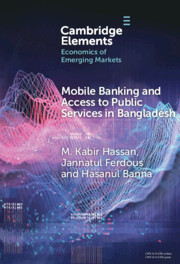Refine search
Actions for selected content:
33 results
Role of the United Nations Educational, Scientific and Cultural Organization (UNESCO), the Organization for Economic Cooperation and Development (OECD) and Global EdTech Standards in Shaping Artificial Intelligence and Cyber Law Curriculum Policies: A Comparative Study of Finland, Singapore and India
-
- Journal:
- International Annals of Criminology , First View
- Published online by Cambridge University Press:
- 03 November 2025, pp. 1-14
-
- Article
- Export citation
1 - Introduction
-
- Book:
- Understanding the Language of Virtual Interaction
- Published online:
- 05 September 2025
- Print publication:
- 25 September 2025, pp 1-8
-
- Chapter
- Export citation
11 - Are New Technologies Beneficial to Liberal Democracy and Good Governance – or Wreaking Havoc on Them?
-
- Book:
- Understanding Technology and Society
- Published online:
- 30 September 2025
- Print publication:
- 10 July 2025, pp 137-147
-
- Chapter
- Export citation
14 - What Are Digital Divides and Why Do They Matter?
-
- Book:
- Understanding Technology and Society
- Published online:
- 30 September 2025
- Print publication:
- 10 July 2025, pp 167-173
-
- Chapter
- Export citation
8 - Do Children Develop Differently in a Digitally Saturated World? Is Digital Technology Helping Children Thrive – or Stunting Them?
-
- Book:
- Understanding Technology and Society
- Published online:
- 30 September 2025
- Print publication:
- 10 July 2025, pp 100-112
-
- Chapter
- Export citation
9 - Digital Literacy
-
- Book:
- Teaching Modern Languages
- Published online:
- 04 September 2025
- Print publication:
- 12 June 2025, pp 152-162
-
- Chapter
- Export citation
7 - People at Screens
-
- Book:
- The Comfort of Screens
- Published online:
- 10 April 2025
- Print publication:
- 17 April 2025, pp 122-141
-
- Chapter
- Export citation
1 - The Comfort of Screens
-
- Book:
- The Comfort of Screens
- Published online:
- 10 April 2025
- Print publication:
- 17 April 2025, pp 1-25
-
- Chapter
-
- You have access
- HTML
- Export citation
8 - People against Screens
-
- Book:
- The Comfort of Screens
- Published online:
- 10 April 2025
- Print publication:
- 17 April 2025, pp 142-159
-
- Chapter
- Export citation
Legal, Ethical and Technological Challenges of New Emerging Technologies for Lawyers: A Mixed Methods Approach
-
- Journal:
- Legal Information Management / Volume 25 / Issue 1 / March 2025
- Published online by Cambridge University Press:
- 10 June 2025, pp. 48-58
- Print publication:
- March 2025
-
- Article
- Export citation
15 - Conclusion
-
-
- Book:
- Defeating Disinformation
- Published online:
- 30 January 2025
- Print publication:
- 06 February 2025, pp 247-256
-
- Chapter
-
- You have access
- Open access
- HTML
- Export citation
Digital technology and language learning: insights from teachers of adult migrant learners
-
- Article
-
- You have access
- Open access
- HTML
- Export citation
7 - Teaching English in the Digital Age
-
- Book:
- Professionalising English Language Teaching
- Published online:
- 24 October 2024
- Print publication:
- 21 November 2024, pp 157-183
-
- Chapter
- Export citation
17 - Reflections from the Academic Debate
- from Part III - The Core Elements of Non-coherence Theory
-
- Book:
- The Non-Coherence Theory of Digital Human Rights
- Published online:
- 22 February 2024
- Print publication:
- 29 February 2024, pp 203-212
-
- Chapter
- Export citation

Mobile Banking and Access to Public Services in Bangladesh
- Influencing Issues and Factors
-
- Published online:
- 26 February 2024
- Print publication:
- 21 March 2024
-
- Element
- Export citation
‘Unprecedented injustice’: Digitalisation and the perceived accessibility of childcare benefits
-
- Journal:
- Journal of Social Policy / Volume 54 / Issue 4 / October 2025
- Published online by Cambridge University Press:
- 26 October 2023, pp. 1320-1339
- Print publication:
- October 2025
-
- Article
-
- You have access
- Open access
- HTML
- Export citation
Chapter 7 - The Harms and Benefits of Social Media
- from Section 2 - Social Media and Mental Health
-
-
- Book:
- Social Media and Mental Health
- Published online:
- 11 October 2023
- Print publication:
- 12 October 2023, pp 67-80
-
- Chapter
- Export citation
Chapter 13 - General capabilities and cross-curriculum priorities
-
- Book:
- Primary Mathematics
- Published online:
- 01 September 2023
- Print publication:
- 07 September 2023, pp 279-296
-
- Chapter
- Export citation
Chapter 8 - The Primary School Age
-
- Book:
- Taking Children and Young People Seriously
- Published online:
- 08 June 2023
- Print publication:
- 22 June 2023, pp 170-201
-
- Chapter
- Export citation
The Lawyering Toolkit: a supportive tool to close the legal literacy gap between learners and practice professionals – a proof-of-concept report
-
- Journal:
- Legal Information Management / Volume 23 / Issue 2 / June 2023
- Published online by Cambridge University Press:
- 11 August 2023, pp. 81-89
- Print publication:
- June 2023
-
- Article
- Export citation
